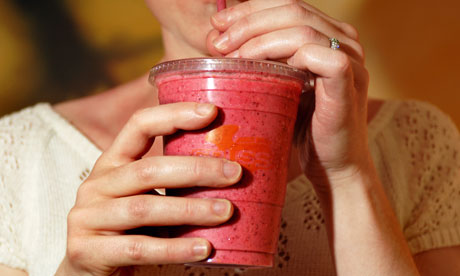
Confused about how you're meant to eat and drink your way to the government's recommended five a day? Picking up one of Tesco's new own-label "3-a-day" smoothies might seem like a smart idea, since each bottle promises to deliver three portions of all-important fruit and veg.
But according to Department of Health guidelines, a smoothie can only count as two portions however much of it you drink.
"Our advice is to limit the fruit and vegetables intake from just juice and smoothies, as the processing reduces the amount of fibre and increases the amount of sugar in the final product which can damage your teeth," says a DH spokesperson. "This is why we recommend that smoothies should count for no more than two of your five a day."
That sounds clear enough. So how can Tesco get away with promoting the idea that its smoothies count as three? It's not exactly being subtle about it either, since there's a big fat number three front and centre on each bottle.
It turns out that the government's five-a-day guidelines aren't backed up by any hard and fast regulation. So although companies that use the official five-a-day logo must meet certain criteria, manufacturers are free to set their own guidelines that ape the party line but differ in the details.
For its part, Tesco says that it's simply making it easy for shoppers to eat more fruit and vegetables. And the fact that its smoothies contain a portion of juice, plus a vegetable puree and a fruit puree, means that people are getting three kinds of healthy hit.
A Tesco spokesperson said: "We work hard to help our customers eat healthily and these drinks are a tasty and convenient way to boost people's intake of fruit and vegetables, while also increasing people's awareness of the importance of eating five portions of fruit and veg each day."
The launch comes at a time when smoothie sales seem to have temporarily hit the skids. According to a Kantar Worldpanel report, sales of smoothies at supermarkets dropped 18.4% between 2011 and 2012. The drop was no doubt partly due to the recession, but it might also reflect the way the sector has been losing its healthy halo, with Which? reporting that some smoothies contain more sugar than Coca-Cola.
"I can see both sides to this issue," says the dietician and nutritionist Gaynor Bussell. "We're seeing that most people are not getting five a day, with some pockets of the country worse than others. In fact, some are lucky if they get three.
"So Tesco might validly say they're actually helping people get more fruit and vegetables. But on the other hand people are confused about what five a day actually is – and this packaging certainly isn't going to help.
"It's something of a cliche, but though drinking smoothies can be an easy way of consuming fruit and vegetables, it isn't necessarily the best," she adds.
The coalition currently favours a food industry that self-regulates rather than having laws imposed from the outside. It's a controversial approach that some scientists have compared to "having burglars install your locks".
And if a big retailer is overlooking the government's recommendations on how many of your five a day should come from a smoothie – can we really trust them to play along when it comes to added salt, excess sugar and saturated fat?

